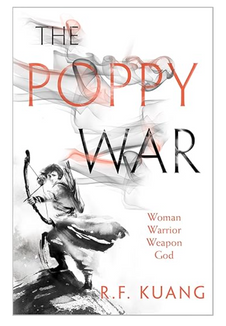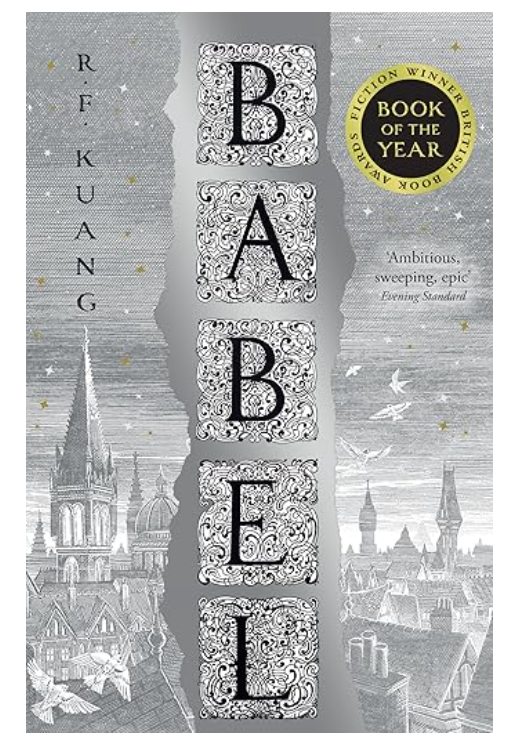Military Fantasy Trilogy: "The Poppy Wars" by R.F. Kuang
- Caroline Hamar

- Jan 16, 2025
- 3 min read
Updated: Jan 20, 2025
R.F. Kuang's Poppy War trilogy - consisting of "The Poppy War" (2018), "The Dragon Republic" (2019), and "The Burning God" (2020) - stands as one of the most ambitious and devastating military fantasy series of recent years. Drawing inspiration from mid-20th century Chinese history, particularly the Second Sino-Japanese War, Kuang crafts a brutal meditation on power, war, and the cycle of violence that has redefined the boundaries of modern fantasy.
The series follows Rin, a war orphan who defies all odds to earn admission to Sinegard, the most elite military academy in the Nikara Empire. What begins as a familiar story of a gifted student facing class prejudice quickly evolves into something far darker as Rin discovers she possesses a lethal aptitude for shamanic powers - the ability to call upon the gods themselves. When war erupts, Rin's powers become both salvation and curse, forcing her to confront increasingly impossible choices between victory and humanity.
The Dragon Republic, the trilogy's second installment, expands the scope dramatically. In the aftermath of devastating choices made in the first book, Rin grapples with PTSD while being drawn into a complex web of political machinations. The book delves deeper into colonialism, modernization, and the cost of progress, as Rin allies herself with forces seeking to transform the Empire into a republic. Kuang brilliantly explores how trauma shapes both individuals and nations, and how the promise of progress can mask new forms of oppression.
The Burning God brings the trilogy to a searing conclusion, with Rin emerging as a revolutionary leader determined to overthrow both foreign invaders and domestic oppressors. The final volume asks difficult questions about power, revenge, and whether the cycle of violence can ever truly be broken. Kuang fearlessly examines how revolution can become tyranny, and how those who fight monsters risk becoming monsters themselves.
Throughout the trilogy, Kuang's background in Chinese history shines through in her meticulous world-building. The magic system, based on the Chinese pantheon and shamanic traditions, feels both mystically powerful and terrifyingly consequential. The military strategies and political machinations are rendered with scholarly precision, while the psychological toll of warfare and power is explored with unflinching clarity.
What sets the Poppy War trilogy apart is its unwillingness to provide easy answers or moral comfort. The series deals unflinchingly with the horrors of war, genocide, colonialism, and the way power corrupts even the most idealistic causes. Readers should be warned that the series contains graphic depictions of violence, warfare, and historical atrocities. Kuang never sensationalizes these elements, instead using them to examine how cycles of violence perpetuate themselves across generations.
The character development across the trilogy is exceptional. Rin's journey from determined student to military leader to something far more complex is both compelling and tragic. The supporting cast is equally well-drawn, with characters like Kitay, Nezha, and the Cike becoming powerful embodiments of the various ways people respond to and are changed by war. The relationships between characters are complex and constantly evolving, shaped by loyalty, betrayal, and the demands of survival.
Critical response to the trilogy has been overwhelmingly positive, with the series winning numerous awards including the 2019 Astounding Award for Best New Writer. Critics have praised Kuang's fearless approach to difficult themes, her intricate plotting, and her ability to combine historical inspiration with fantasy elements in a way that illuminates both. The series has been particularly noted for its exploration of colonialism and military conflict from a non-Western perspective.
The Poppy War trilogy represents a significant evolution in military fantasy, proving that the genre can tackle serious historical and political themes while maintaining narrative momentum and emotional impact. It's a series that demands much from its readers, offering neither easy answers nor moral comfort, but rewards that investment with profound insights into power, war, and human nature. For readers willing to engage with its challenging themes and unflinching portrayal of warfare, the trilogy offers a uniquely powerful and thought-provoking experience that has redefined what military fantasy can achieve.









Comments